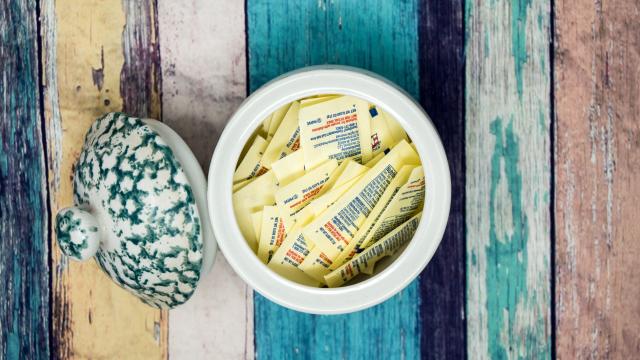Artificial sweeteners have become popular for people who want to reduce their sugar intake for health or weight reasons. You probably recognise some of them by their brand name: Sucralose (Splenda), saccharin (Sweet and Low), aspartame (Equal) and stevia (used by a number of brands). Each has varying levels of sweetness and uses.
Image by frankieleon.
These sugar substitutes are popular among people suffering from diabetes because they don’t spike blood sugar the same way sugar does, and among dieters who want something “sweet” without the hefty kilojoules. Because unlike table sugar, which has approximately 70kJ per teaspoon, Splenda, Sweet and Low, Equal and stevia all contribute little to no kilojoules.
It should be noted that there are still lingering health concerns related to the use of artificial sweeteners. Some studies have linked them to an increased risk of cancer although that has been somewhat debunked by The World Cancer Research Fund. Anti-sweetener campaigners had demanded more research into this matter.
Here’s where there sweeteners differ:
- Splenda (sucralose): Sucralose isn’t broken down in the body, so it has zero kilojoules. It’s about 600 times sweeter than table sugar and can be used in anything. Since it doesn’t lose its sweetness when you apply heat to it, you can use Splenda in hot foods and baking.
- Sweet and Low (saccharin): Sweet and Low is one of the first available artificial sweeteners and used in foods, medicine and even in toothpaste. Saccharin is 200 to 700 times sweeter than sugar, has no kilojoules, and can be used in cooking, too. It’s mainly available in the US but you can get it in Australia through online retailers.
- Equal (aspartame): Aspartame is typically found in chewing gum, diet soft drinks, puddings and many other “sugar-free” snacks. It’s 200 times sweeter than sugar, but it does have some kilojoules (a measly 8kJ or so) per packet. It also loses its sweetness when heated so it’s not ideal in baked goods. According to Food Safety Australia: “Soft drink giants Coca-Cola and Pepsi have both made the move towards making healthier products by removing the artificial sweetener aspartame from their diet drinks, in favour of a more natural alternative.”
- Stevia (available through a number of brands): Because the sweetness of stevia is derived from the leaves of a plant called Stevia rebaudiana, it’s often touted as a “natural sweetener”. It’s about 200 to 400 times sweeter than sugar.
As fellow Lifehacker writer Beth Skwarecki notes, saying a sugar substitute is “200 times sweeter than sugar” means the manufacturer used 1/200th as much of it to match table sugar’s sweetness. Artificial sweeteners get a lot of bad press, so if you’re worried, check out our breakdown of artificial sweeteners’ safety in your diet.

Comments